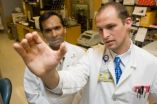New hope for lowering cholesterol
2011-03-03
(Press-News.org) A promising new way to inhibit cholesterol production in the body has been discovered, one that may yield treatments as effective as existing medications but with fewer side-effects.
In a new study published in the journal Cell Metabolism, a team of researchers from the UNSW School of Biotechnology and Biomolecular Sciences - led by Associate Professor Andrew Brown – report that an enzyme - squalene mono-oxygenase (SM) - plays a previously unrecognised role as a key checkpoint in cholesterol production. The team included doctoral students Saloni Gill and Julian Stevenson, along with research assistant Ika Kristiana.
SM is one of at least 20 enzymes involved in the assembly line when cholesterol is made throughout the body but only one - HMG-CoA reductase (HMGR) – is currently targeted by medications to lower cholesterol levels in the blood.
"The class of drugs most commonly used to lower cholesterol - statins – are the blockbusters of the pharmaceutical world and work by inhibiting HMGR," says Professor Brown.
"But HMGR is involved very early on in the assembly line, so inhibiting it affects all the other steps down the line – and other useful products it provides - and that can give rise in some people to unwanted side-effects, such as muscle pain.
"What's exciting about this previously overlooked SM enzyme is that it acts as a checkpoint much further down the assembly line, which should mean that it can be more specifically targeted at cholesterol production instead and leave the early part of the assembly line undisturbed.
"Cholesterol has developed something of a bad name, so many people don't realise that it is actually essential for a healthy body. It's needed, for example, to make sex hormones and to help build the walls of every single cell in our bodies."
Usually, cholesterol production is very finely controlled through a system of checks and balances. The problem comes when we have a lifestyle (often combined with a genetic predisposition) that results in too much cholesterol being produced and not enough being disposed of. This can overwhelm those controls and result in cardiovascular disease.
Professor Brown likens this process to the water supply to a home: water is essential but careful control is needed for how and where it is delivered and at what rate.
"In effect, statins work like turning down the water supply at the mains," he says. "If new drugs can be developed to inhibit the later control point that we've discovered, this would be like having the ability to slow the flow at a particular tap, leaving the rest of the home unaffected."
As it happens, medications already widely used for treating fungal infections have been shown to work by inhibiting the fungal enzyme equivalent of SM. Anti-cholesterol drugs that target SM for human use still need to be tested.
INFORMATION:
END
ELSE PRESS RELEASES FROM THIS DATE:
2011-03-03
A multinational study has identified a key gene mutation responsible for type 2 diabetes in nearly 10 percent of patients of white European ancestry.
The study, which originated in Italy and was validated at UCSF, found that defects in the HMGA1 gene led to a major drop in the body's ability to make insulin receptors – the cell's sensor through which insulin tells the cell to absorb sugar. This drop in insulin receptors leads to insulin resistance and type 2 diabetes, according to the paper.
Findings appear in the March 2 issue of the Journal of the American Medical ...
2011-03-03
Metal-on-metal artificial hips are producing complications and injuries not seen with their plastic or ceramic predecessors. Recently, the U.S. Food and Drug Administration has drawn attention to the problems of these specific prostheses.
Total hip replacement systems consist of a ball and socket just like an organic hip. When both the ball and cup are made of metal, in the course of normal movements, such as walking or running, the metal ball and metal cup slide against one another. If the design is imperfect, complications can arise. Excessive friction, excessive looseness, ...
2011-03-03
ST. PAUL, Minn. – New research suggests that ibuprofen may offer protection against developing Parkinson's disease, according to one of the largest studies to date investigating the possible benefits of the over-the-counter drug on the disease. The study is published in the March 2, 2011, online issue of Neurology®, the medical journal of the American Academy of Neurology.
Parkinson's disease is a brain disorder that causes tremors and difficulty with movement and walking. It affects about one million people in the United States.
"Our results show that ibuprofen may ...
2011-03-03
The current clinical trial process in the United States is on shaky ground. In this era of personalized medicine, as diseases are increasingly defined by specific genetic and biologic markers and treatments are tailored accordingly, patient populations for new therapies grow smaller and smaller. Coupled with skyrocketing costs and expanding regulatory requirements, the completion of trials that are essential in bringing new and effective therapies to patients is no easy task.
Change is needed.
Today, in the New England Journal of Medicine, a group of renowned researchers ...
2011-03-03
Immigration debates are often fueled more by rhetoric than by actual facts and figures. Fortunately, the non-partisan Pew Research Center (which does not take positions on policy issues) offers objective statistics on immigration in their annual survey of national and state trends in immigration, as published by the Pew Hispanic Center.
The national highlights from Pew's 2010 immigration report include:
- Unauthorized immigrants make up about 3.7 percent of the nation's population --approximately 11.2 million persons. That number is statistically unchanged from last ...
2011-03-03
ANN ARBOR, Mich. — Researchers at the University of Michigan Comprehensive Cancer Center have identified a potential target to treat an aggressive type of prostate cancer. The target, a gene called SPINK1, could be to prostate cancer what HER2 has become for breast cancer.
Like HER2, SPINK1 occurs in only a small subset of prostate cancers – about 10 percent. But the gene is an ideal target for a monoclonal antibody, the same type of drug as Herceptin, which is aimed at HER2 and has dramatically improved treatment for this aggressive type of breast cancer.
"Since SPINK1 ...
2011-03-03
PROVIDENCE, R.I. [Brown University] — What makes a man? His clothes? His car? His choice of scotch? The real answer, says Brown University biologist Erica Larschan, is the newly understood activity of a protein complex that, like a genetic power tool, gives enzymes on the X-chromosome an extra boost to increase gene expression. The process is described in the March 3, 2011, issue of the journal Nature.
Women have two X-chromosomes in their genomes while males have an X and a Y. Gender is defined by that difference, but for men to live, the genetic imbalance must be remedied. ...
2011-03-03
The recent sentencing of a 28-year-old Gaston County man for multiple sex offenses, including second-degree sex offense of a child and one count of indecent liberties with a child, reveals the severe consequences that a conviction or guilty plea can bring. Marcus Stephen Archer pleaded guilty to two of six counts and faces up to ten years in prison as well as lifetime registration as a sex offender. He will also be required to submit to satellite monitoring after his release from prison.
Archer admits not remembering the events due to heavy drug use during the time the ...
2011-03-03
With the steep decline in populations of many animal species, from frogs and fish to tigers, some scientists have warned that Earth is on the brink of a mass extinction like those that occurred only five times before during the past 540 million years.
Each of these 'Big Five' saw three-quarters or more of all animal species go extinct.
In a study to be published in the March 3 issue of the journal Nature, University of California, Berkeley, paleobiologists assess where mammals and other species stand today in terms of possible extinction, compared with the past 540 ...
2011-03-03
Thousands, if not millions of people worldwide, use Tylenol or Tylenol-related products with the active ingredient Acetaminophen each week. The over-the-counter drug is labelled as an effective treatment method to reduce a fever and relieve minor aches and pains. While it is considered safe by medical professionals in some circles, new information about the risks of prolonged use, overuse and even common use have raised red flags for medical professionals.
It is well-known that excessive use of Acetaminophen (may be abbreviated as APAP on drug labels), such as an accidental ...
LAST 30 PRESS RELEASES:
[Press-News.org] New hope for lowering cholesterol

